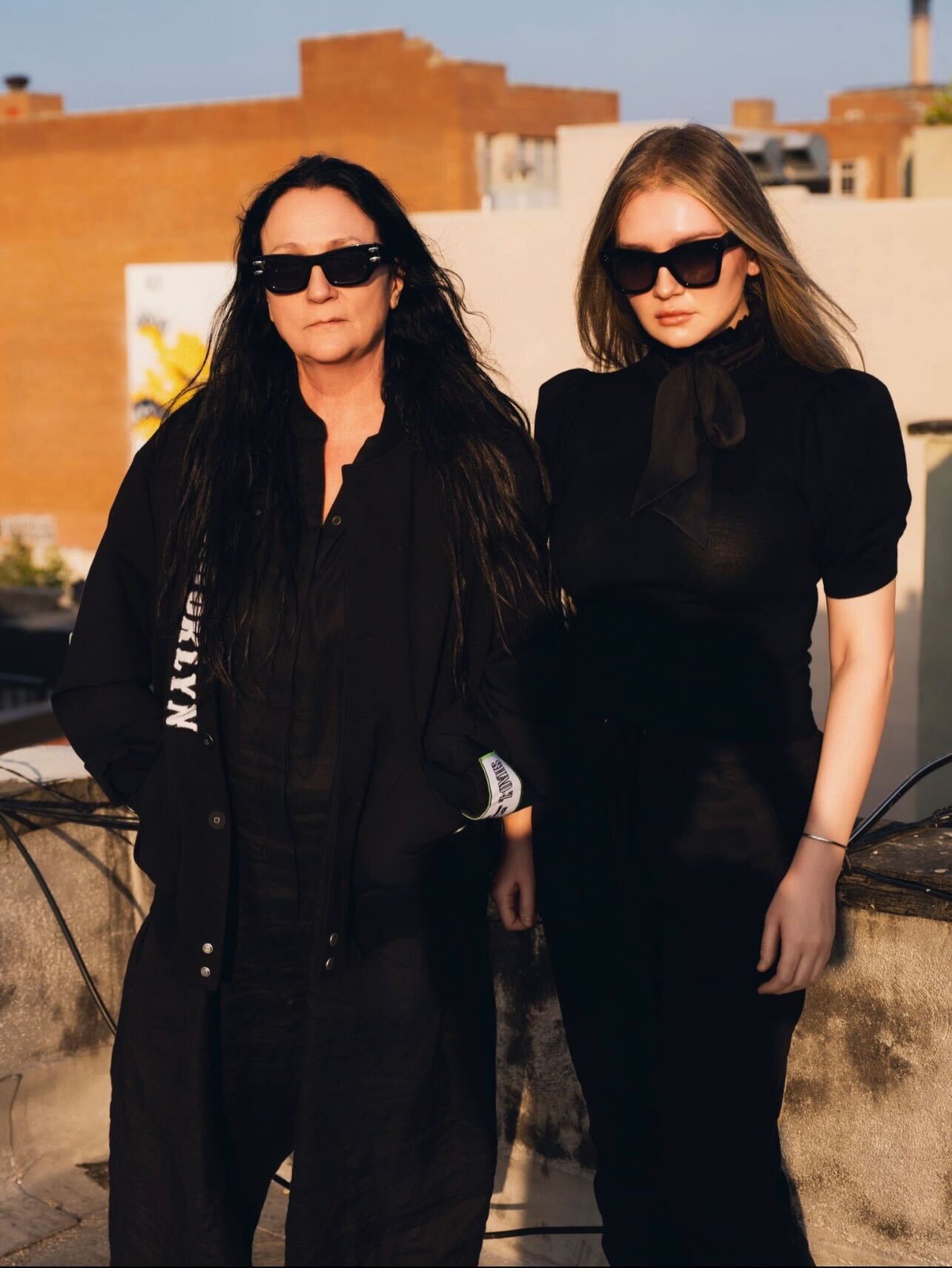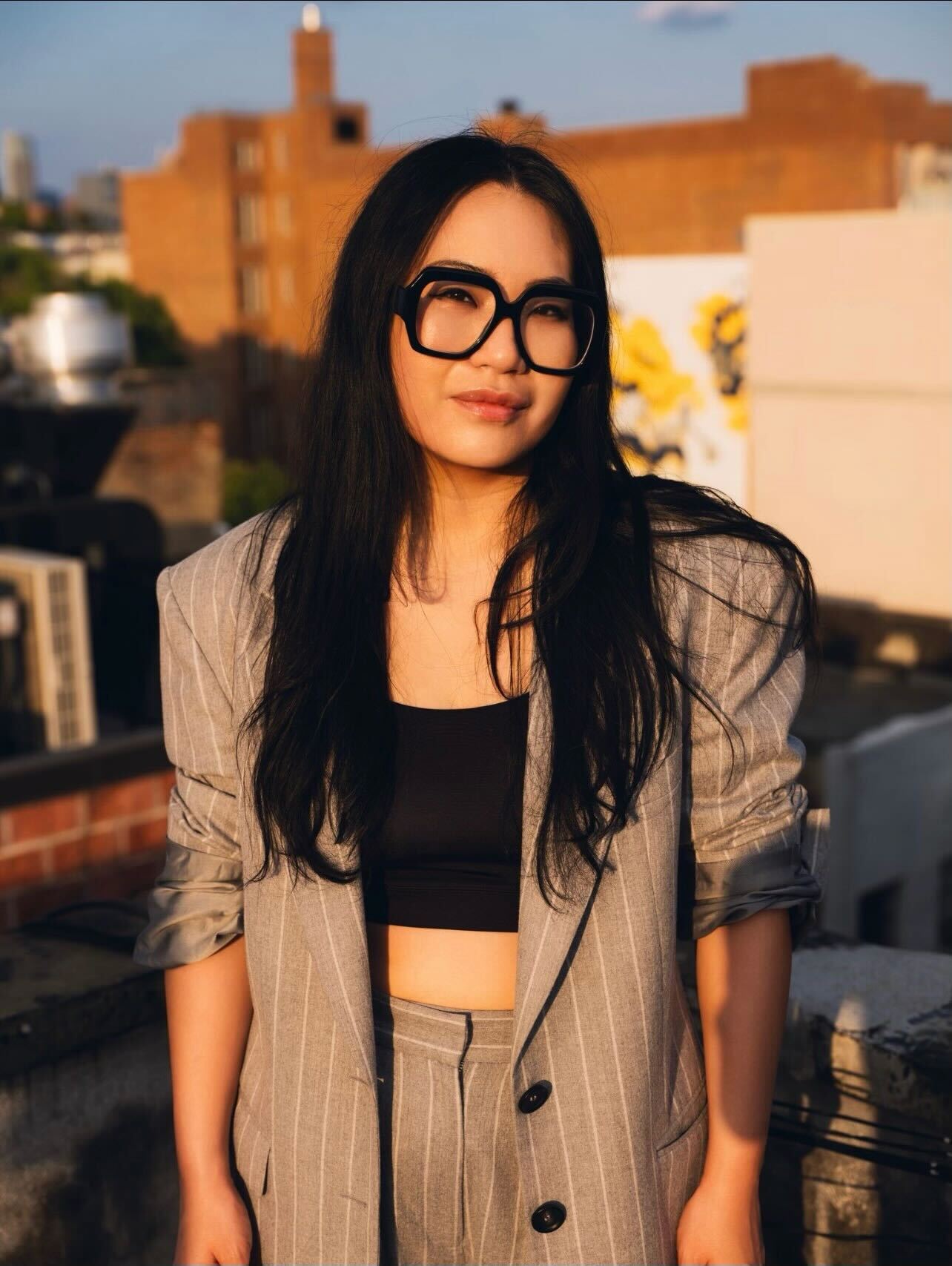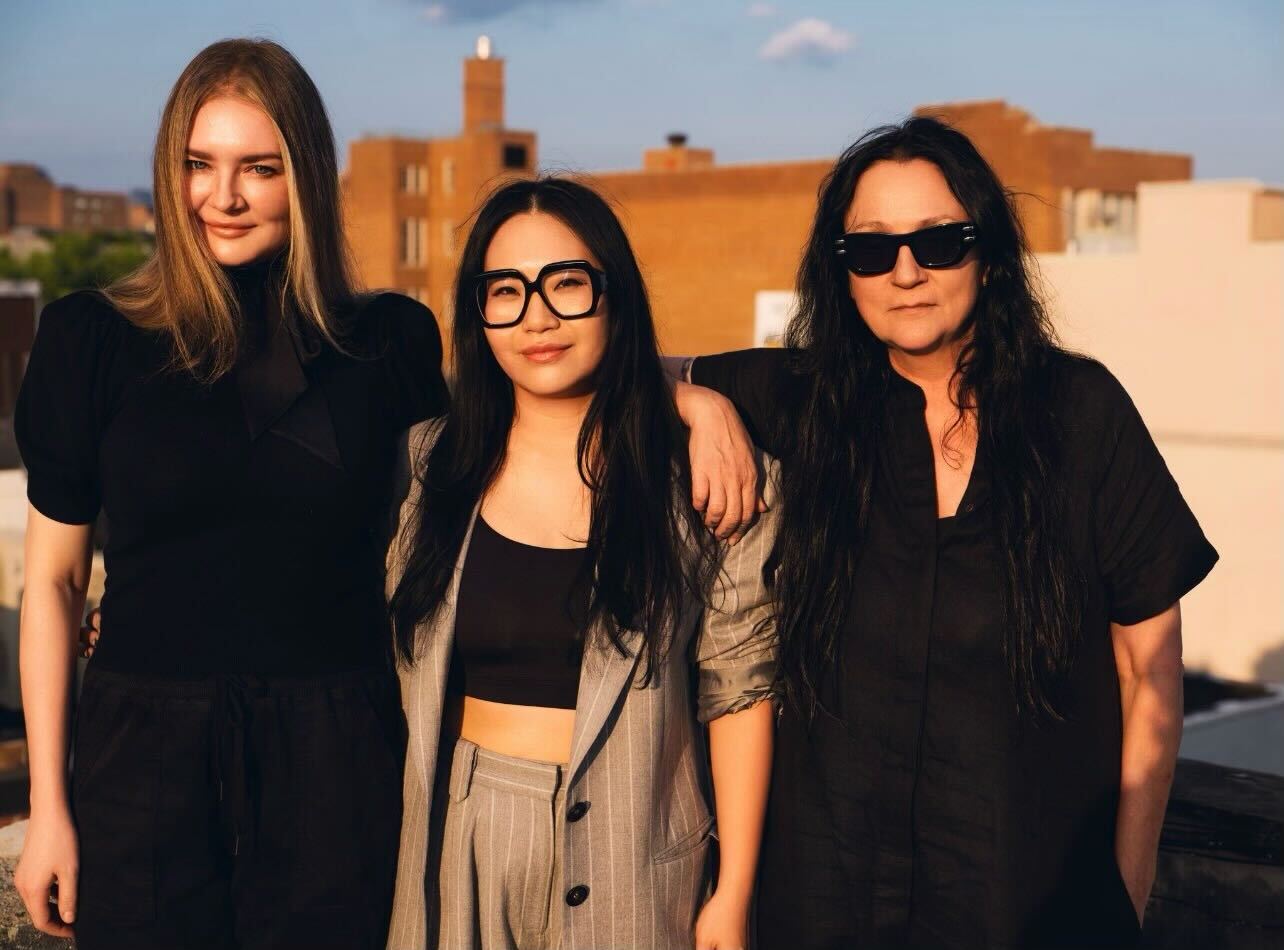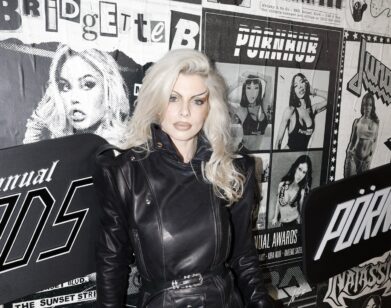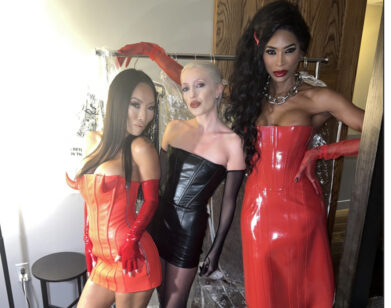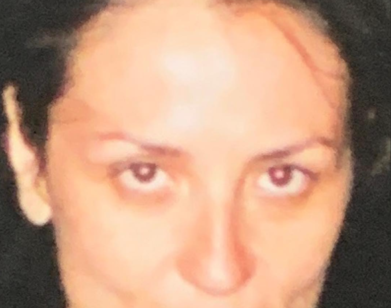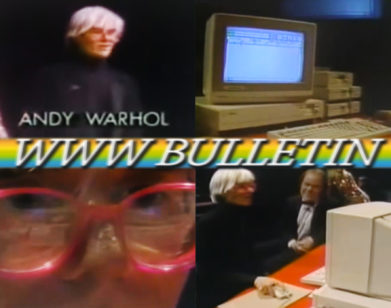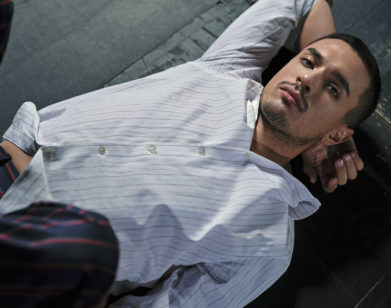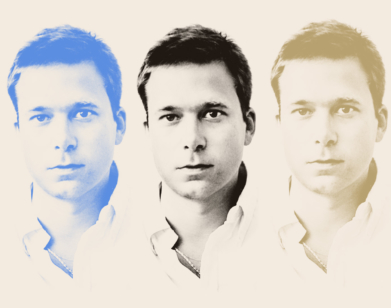NYFW
Anna Delvey and Kelly Cutrone Throw a Fashion Show on House Arrest
This New York Fashion Week, one of the season’s buzziest shows features a brand new player. Fashion PR powerhouse Kelly Cutrone and socialite-scammer sensation Anna Delvey are the brains behind OutLaw, new pop-up agency producing Parsons grad Shao Yang’s debut NYFW collection. The show is a little unconventional: pre-glammed models in Shao’s chic tailoring will be bussed from a Canal Street studio to Delvey’s front door-cum-runway, where she currently remains on house arrest, as a select group of fashion editors await the presentation. Amid the hype, our senior editor visited the OutLaw team at Delvey’s apartment to talk about media fiascos, fashion week, and tales from Rikers Island.—MEKALA RAJAGOPAL
———
SCARABELLI: First thing I want to know is, how did you guys meet?
CUTRONE: We met first through pop culture. I came downstairs one morning and my daughter was like, “Oh, my fucking god, Anna Delvey is on Call Her Daddy and she referred to you as one of the reasons why she moved to New York.” And then Steven Grossman, who works at Untitled, which is a very big management company I started with Jason Weinberg, called me and said “Do you know Anna Delvey? We’re thinking about doing some stuff with her.” And I said, “You absolutely should. By the way, I would love to meet her,” because I had this idea to do a pop-up agency and call it OutLaw. I thought it’d be really good for my client [Shao Yang] if we shared our platforms, and I thought it would be good for Anna too. I mean, obviously I had to sit the client down since they’re a first time designer, and be like, “We’re going to overshadow you.”
SCARABELLI: 100%. So this is her very first show?
CUTRONE: She started out as a Parsons graduate in tailoring and she somehow became, as a non-gay person, an LGBTQA pioneer in bespoke suitings, with a very strong percentage of it being gay women. Nigel Barker, who was on Top Model, wanted me to meet them because they were about to take on a brand for Dog Pound, the gym where Taylor Swift and Justin Bieber and all those people work out. He might be great at gyms, but I didn’t think that he had the right headspace to be in the fashion business. So I told them, let’s take the streetwear part and the suiting part and put it into a new brand, and let’s call it Shao because that’s your name. And it’s such a cool name, like, Shao, wow, pow.
SCARABELLI: But that’s also nice to have that foundation and actually know how to tailor.
CUTRONE: Which is—
SCARABELLI: A lot more than most designers.
CUTRONE: And people are going to be interested because of the platform, but CNN Style is not going to come to see Shao if I just say, “Shao Yang is a first generation American-born Chinese designer who graduated from Parsons with an emphasis on LGBTQA tailoring and non-binary clothing. As a result of her relationship with Dog Pound, we decided to take streetwear influences and infuse them into the bespoke tailoring that she’s become masterful at.”
SCARABELLI: Wow. You’re so good at on-the-fly press releases.
CUTRONE: Who’s actually going to come to that? No one. That is the fucking truth. The schedule is really tight, and none of these emerging brands have any money to pay for celebrities. So how can I, in 2023, tell somebody who’s going to spend minimum 125k, “You’re going to do this, and if you’re lucky, you’re going to get in Women’s Wear Daily and four mid-level stylists are going to come, none of whom will pull any clothes in the next two months. No retailers are going to buy your collection because nobody’s ever seen what you’ve done before. And you’re definitely not going to be on Vogue Runway, or get reviewed in the New York Times.” And the clothes need to be good enough because it isn’t a long runway, it’s a U, so people are going to see the clothes very closely.
SCARABELLI: Right. Anna, did you have any reservations about this?
DELVEY: No, not at all. I was so surprised that Kelly was even selling herself to me. I was like, “You really did not need to continue this pitch.” I was watching her show when I was still a teenager in Germany.
SCARABELLI: I guess I’m curious more about why you wanted to work with Anna specifically.
CUTRONE: Because she’s a genius. She understands the media and brands and communication. People may or may not like that about her. They may or may not like that about me. But I think that once you’re put through the pop culture wringer, which we both have, you want people to know who you are. For me, my ego is what drove me into this business in the sense that I had something to prove. People don’t really address stereotyping for power chicks, but if you look me up, it’s like, “Cutrone bitch, Cutrone witch.” And then people who know me are like, “She has a daughter. And she makes really good food.” What is Anna supposed to do? Spend her whole life giving restitution for a choice that she made in her 20s or early 30s? Who cares? I’ve made a million bad choices in my career.
DELVEY: Are you paying my restitution now?
CUTRONE: [Laughs] And New York is boring. This is a pleasant fashion week for me. We’re having a good time. It might just be a one-off thing, but it might actually become a real business where we do special projects. I mean, who wouldn’t hire us? We are the OutLaw Agency.
SCARABELLI: I like the idea of you starting a line, Anna. Looking at some of your drawings, it seems like you’re already designing clothes in a way.
CUTRONE: Correct.
SCARABELLI: Do you have people over a lot?
DELVEY: When I just got out, it was nonstop, but it’s very distracting. Everybody thinks, “Anna’s on house arrest. She must be partying.” And at the beginning I would wake up to people texting me at four in the morning if they could come over after everything was closed. I was like, “I don’t even know you.”
SCARABELLI: That’s funny.
DELVEY: I got out October 7th of last year and October, November, December, I was pretty wild. And then I had my birthday party. It gets old really quickly.
CUTRONE: Wait, you spent COVID in prison? Did people die in prison of COVID?
DELVEY: No, nobody I met. I was in Albany, upstate. It was actually really funny to see how the government reacts to everything, because we would get announcements from our COs in real time. It was like, “Now you have to wear the masks when you get out of your cubes.”
CUTRONE: Can you do anything fun there?
DELVEY: Yeah. We had a yoga class.
CUTRONE: Really?
DELVEY: We had a volunteer who would come every Monday. But then Covid happened, so she could not. Any civilians that were non-essential were banned. Which was actually really great because I was in this culinary vocational class, which I hated. They actually put me in high school to get my GED because they had to wait for my German school to fax it over. You can’t just send them a copy of it. They have to get it directly from the school, otherwise they will put you in the GED class. I’m like, “This is a joke.” You have to wake up at 7:00 in the morning and go to school at 8:00.
SCARABELLI: Like, you’re already in prison.
DELVEY: I was like, “I’m almost 30 years old.”
SCARABELLI: Do you think it’s harder to navigate the prison hierarchy or the fashion world hierarchy?
DELVEY: I think people are just people. I feel jail is a society on a smaller scale.
SCARABELLI: But there must be some sort of social hierarchy in prison.
DELVEY: Oh, definitely. In female prison the worst thing that you could be there for is any baby crimes.
CUTRONE: Same in men’s prison. If you touched a kid or killed a kid it’s the worst.
DELVEY: But women, usually they kill their babies. That’s the worst. So this girl on the news, she got arraigned and came to Rikers. This girl took her mattress out. She’s like, “You’re not coming here.” Inmates run Rikers a lot, so it’s easier for the staff to just acquiesce.
CUTRONE: I think also it’s weird that you were doing time when everybody was doing time.
DELVEY: Oh, yeah. It was never lonely there. At Rikers I was in cells. In Albion, they don’t really have cells, but they have cubes. This is a bigger space and it houses, I don’t know, 40 females, but it’s rarely full. And then the cube is maybe five-foot-five, so if you stand up you can see somebody else over the curtains. Back to the COVID thing. It was really funny to see how the government would impose all these wild rules because they were so scared of being sued. We breathe the same air. We can’t just wear masks 24/7.
SCARABELLI: So you’re saying it wasn’t actually the best time to be in prison?
DELVEY: I mean, I’m sure it was not pleasant for anyone. It’s just a different kind of problem. I’m sure if I was outside, I’d have something else to complain about.
CUTRONE: Like having to fire your whole team and take care of the 19-year old who’s going to college online.
DELVEY: It was just really funny to witness how the government works and how the rules are being implemented. They’re just trying to save themselves.
CUTRONE: I was a consultant to Jason Flom for the Innocence Project and I did the Wrongful Conviction podcast PR for him. And met a lot of people who did a lot of time that were guilty of certain things, but not what they were convicted of. So the system is flawed, and it’s certainly not democratic. People do not like powerful women. That’s the truth, if you look at some of the women that we know in pop culture that have been sent to prison.
DELVEY: And a lot of it’s about trends too, what they like to prosecute.
CUTRONE: There’s a lot of PR involved with sending messages to people.
DELVEY: You can get convicted of anything if somebody sets their mind to it.
CUTRONE: I think that Anna’s made the best of an uncomfortable situation. I’ve never met anybody who’s come onto the scene the way any of us have that hasn’t been through fucking hell in a hand basket. I found myself in horrible situations as the owner of a business over the years, way in over my head. It’s like a vicious game of chicken. You have no fucking idea what you’re doing.
SCARABELLI: And easy to get in a situation where you’re in trouble.
CUTRONE: It’s very easy to get into a situation where you think you’re moving up and you’re actually in the middle of an avalanche. It’s about really understanding the law and understanding the loopholes.
DELVEY: I think the moral hazard of it is very similar. It’s just the framing of it is different.
SCARABELLI: I also think a lot of people wish we had the club you were trying to build.
DELVEY: It wasn’t even that groundbreaking of an idea. I’m glad Fotografiska actually did it.
CUTRONE: Do you think you’d want to be in real estate again?
DELVEY: First of all, it was just to explain how delusional I was. I wanted to build a building in New York when I was 23. I was like, “Why don’t we build a pyramid?” My friend, who was an architect, was like, “Yeah, if you want to spend the next 10 years of your life getting permits.”
CUTRONE: It’s so much work, right.
DELVEY: Yeah, it was a fun idea. And it was supposed to be an art foundation. The private club was never supposed to be the center of it, it was just a way to monetize it.
SCARABELLI: But an art foundation is a good way for wealthy people to lose their money around.
DELVEY: It’s about the brand. If you create a good brand then you can just add whatever, like a small hotel. Soho House Hotel is very popular and I like it. But it’s very small. And I wanted to expand.
SCARABELLI: What designers are you obsessed with now?
DELVEY: I just want simple stuff. I like The Row.
SCARABELLI: I’ve been thinking that a lot lately too, where I’m like, I just want to wear mom jeans.
DELVEY: Well, quiet luxury—is that over now too?
SCARABELLI: I mean, I don’t like that term.
DELVEY: It’s very Midwest.
CUTRONE: I like that one good thing. That’s what I’ve always done. Or one great thing, I always thought that would be a cool name for a collection.
DELVEY: I’d rather buy very expensive sweatpants that you wear on an everyday basis as opposed to some crazy dress that you’re only going to wear once.
CUTRONE: I think everybody that works in fashion knows that monochromatic is the way to go.
DELVEY: Because it’s such a good investment.
SCARABELLI: I think it’s cool that you’ve kind of—I don’t want to say pivoted, because maybe you always were a media guru. But I like what you wrote for Insider, and I listened to your podcast this morning with Natasha [Stagg]. I thought that was really good. I think it’s cool to show off your intellectual side. People don’t see that in the mass media.
CUTRONE: I think everybody loves Anna. I mean, besides six finance guys. [Laughs]
DELVEY: People like me from far away.
SCARABELLI: Nobody knows anybody for real, but your story is heroic. But the PR thing is interesting too, because you’re a storyteller.
CUTRONE: We’re storytellers. At the OutLaw Agency we are telling lots of people’s stories for them. And we’re using our platform to bring attention to them.
DELVEY: But I need to get my social media back. They just did it to me just to make my life as hard as possible. It’s to make me violate so they can put me back in jail. If I post on my Instagram right now, I’ll be in jail tomorrow.
CUTRONE: Wow, that’s crazy.
DELVEY: They want to give me the temptation because I still have my accounts. I did not delete them or anything. I could just say, “Fuck it,” and go to Europe tomorrow and I’ll have my Instagram. I’m not going to be on parole.
CUTRONE: Are you allowed to fly out of the country?
DELVEY: Yeah, forever. [Laughs]
SCARABELLI: That’s what they want, right? They want you to leave.
DELVEY: Yeah. I’m only in house arrest because of ICE, because I have a German passport and I overstayed my ESTA. My criminal conviction is still under the first round of appeals, so it’s not considered final. So if I were to die today, you can’t really say that I was convicted. But once the first round of appeals has been denied, then you’re convicted.
SCARABELLI: So you’re here because you’re worried that if you leave you would never be able to come back to America?
DELVEY: Well, ICE came to see me regularly right after I found out that I was going to be released. So I got a lawyer, but then Biden took office in January and he was trying to put a moratorium on all deportations, especially for people with nonviolent crimes. So two days before I was supposed to be released, ICE came to see me saying I’m not a priority anymore and to show up to 26 Federal Plaza after I was released on parole. I went to 26 Federal Plaza, where they’re like, “Well, now we’re going to take you into custody.” I guess the rules became clearer or whatever. They don’t really provide you a reason. Maybe because of my Instagram posts, and I tweeted, “My rap sheet’s longer than their dicks can ever be,” which is satire. My rap sheet isn’t even that long.
SCARABELLI: Right.
DELVEY: As far as we know, I’m the only person on house arrest because of ICE.
CUTRONE: What happens if we get married?
DELVEY: I don’t even know. It’s not going to be that easy. It definitely can’t be fraud or anything.
SCARABELLI: So what is the solution?
DELVEY: It changes every day. The system is kind of a shit show. They change rules all the time and it’s also set up against poor people. I was in ICE jail with all these girls who don’t speak English. And I’m sure they just get deported. What are you going to do?
SCARABELLI: A lot of refugees also end up in the wrong place.
DELVEY: It’s very sad.
CUTRONE: It’s horrible to be in limbo.
DELVEY: But the sad part about it is you get used to it. You have two calendars all the time. You go to trial, are they going to convict? Maybe, maybe not. Sometimes I think it does more damage to be in jail for 10 days and not have that income or not have your kid as opposed to being there for 10 years.
CUTRONE: You probably met a lot of sad moms in prison.
DELVEY: Yeah, I don’t have anybody waiting for me. My parents are healthy, I’m pretty young. I don’t have kids. I can afford to stay in ICE jail. Try to fix it. Not everybody can.
SCARABELLI: You said something interesting on your podcast about being scared to be free—
DELVEY: I don’t think scared is the right word. I’ll make it work, please, I want to be free. But it’s crazy to think, “If I could do anything at all, what would I be doing?” Like the sketches [gestures to wall], I did them while I was in Orange County jail and I couldn’t have anything bigger than the standard-sized paper. I couldn’t have any other materials. Sometimes it’s easy to work around constraints. You don’t want to have too many, like house arrest is a huge one. But sometimes it limits your choices and you just figure out the way around it.

